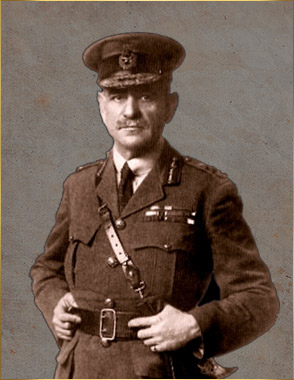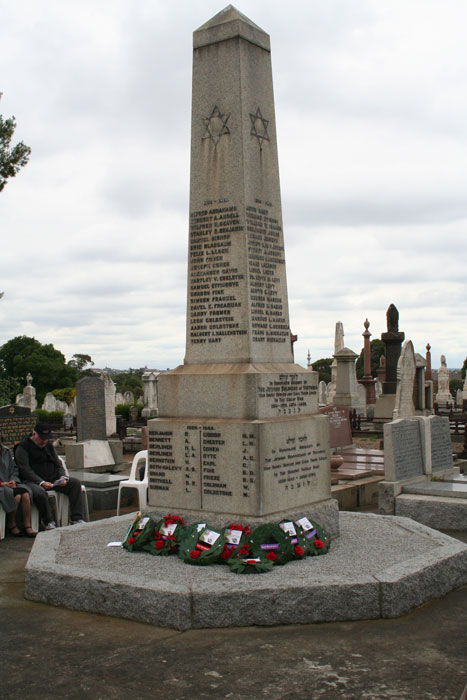Victorian Association of Jewish Ex & Servicemen & Women Australia Incorporated
Founding Member General Sir John Monash GCMG KCB VD
Cohen
Surname
Cohen
First names
Jack
Rank
Major & CO
Service No.
28133V
Date of Death
29/11/2012
Hebrew Date
15 Kislev 5773
Hebrew Date
ט״ו בְּכִסְלֵו תשע״ג
Age at Death
93
How Died
Where Died
Melbourne, Victoria, Australia
Cemetery
MCK Cemetery, Springvale, Victoria, Australia
Service Details
South African Infantry & 101 Squadron, IAF
Served
Occupation
Age at Enlistment
Place of Enlistment
Locality on Enlistment
Religion
Jewish
Gender
Male
Date of Enlistment
1939 South Africa / 1948 Israel
Date of Discharge
1942 South Africa / 1951 Israel
Country of Enlistment
South Africa / Israel
Notes
Jack Cohen was a fighter pilot in the South African Air Force during World War Two, and then in the Israeli Air Force during the Arab-Israeli war from 1948 – 1949. Jack Cohen began his military career in the South African Active Citizens Force, joining the infantry division as part of compulsory national service for all boys 16 years and older. With the onset of World War Two in 1939, Jack, now member of ‘Q services’ (transport division), volunteered for a transfer to the Air Force. “When the war broke out, the army wanted us to sign on full-time, because they were all volunteers in South Africa. So I said no, I wasn’t going to sign on with the army, I said I was waiting for the airforce to call me because I had been to see them already.” “They made me lots of promises, you know I was very naive, I believed what they said, so they got me to sign up. A couple of weeks after that I got a letter from the airforce to say to come before the selection board. I was very proud, very happy. I went and saw the same Adjudent, and I will never forget his exact reply to me. He said ‘Jack,’ he said, ‘your in the army now and you’ll bloody well stay in it.’ So I became a bit of a rebel, and I went out of my way to get into trouble.” Cohen earned himself a 90 day detention stint, after refusing to transfer to the combat infantry. Fed up with his denied request to join the airforce, Cohen faked an illness and was subsequently sent to a hospital in Cairo where he had his appendix removed. “I decided I wanted to give it one more bat, so I went and reported sick one day. I knew there was nothing wrong with me, but anyway. So they sent me to number five general hospital in Cairo. They examined me there, I must have given them all the right answers, and they told me I had acute appendicitis. So I said well what are you going to do?, and he said well we are going to have to operate. So I said well go ahead, and they took my appendix out.” “When we started getting casualties in I went to the OC, and I said you’re getting a lot of casualties and they need the beds more than I do, I think it’s about time you kick me out. So he said ‘Jack sit down.’ He said ‘you know there was nothing wrong with you.’ I said yes I know, you told me that I had acute appendicitis. So he wanted to know the whole story, so I pulled him in, and it was through him that I got a transfer to the airforce.” After his training Cohen was passed fit to fly and was assigned to 4 Squadron. He saw action in North Africa, and then again in Italy, and all along the Adriatic Coast where he carried out mostly ground attacks upon the Axis forces. He flew mostly Spitfire’s and Mustang’s during the war. “She was the most wonderful aircraft, [the Spitfire] the American planes were alright, the Mustang eventually became a very nice aeroplane, but like all American planes, you’d do something wrong and they’d turn around and bite you. The spitfire gives you a chance, it says ‘dont do that again.’ You could get away with murder in the old spit. She was so maneuverable that you could fly inside all the others. I loved that old plane.”At the conclusion of the war Cohen was released from the South African Air Force in 1946, and volunteered to join the Israeli Air Force in 1948, becoming a member of 101 squadron. Cohen fought in the Arab-Israeli war of independence, carrying out an attack on El Arish airfield. “We took off with bombs up, flew at deck level over the sea and turned inland at El Arish. Here we really went to town. First we bombed the runways, putting them out of commission, strafed any planes that were on the tarmac and even fired almost from ground level into the hangers. One thing was for sure, they never used that base again.” Despite having no regrets, Cohen still despises of war. “War itself is a mugs game.” “The finest thing I ever heard was from another fellow, a serviceman like me, he had been in the airforce as well, he said ‘if there is another war’ he said, ‘send the politicians, not the boys,’ and he was so right.” Cohen returned to South Africa after serving in the Isr

 John Monash (Monasch) born
in Melbourne, Australia on 27 June 1865, the son of
German Polish Jewish migrants, can be researched in any
military history encyclopaedia or in fact by just
‘Googling’ his name on the internet. His history
and list of achievements are long and far too many to detail
in this brief summary. However, might I say that reading his
history is well worth the effort and I can assure you that
his deeds will amaze you. I have found that the deeds are
better labelled on more than one man and in more than one
lifetime.
John Monash (Monasch) born
in Melbourne, Australia on 27 June 1865, the son of
German Polish Jewish migrants, can be researched in any
military history encyclopaedia or in fact by just
‘Googling’ his name on the internet. His history
and list of achievements are long and far too many to detail
in this brief summary. However, might I say that reading his
history is well worth the effort and I can assure you that
his deeds will amaze you. I have found that the deeds are
better labelled on more than one man and in more than one
lifetime. An
announcement was made in the weeks leading up to the
Centenary of ANZAC by Judy Landau, President VAJEX Aust.
She stated that it gave her great delight to announce
that VAJEX Aust (Victorian Association of Jewish Ex
& Servicemen & Women Australia Inc) has
successfully raised the required funds to build a new
Victorian Jewish Memorial after the style of the
historic Memorial located in the Jewish section of the
Melbourne General Cemetery. After an extensive two year
process, Judy has single-handedly sought letters of
support, raised the funds, and obtained approval from
the City of Port Phillip.
An
announcement was made in the weeks leading up to the
Centenary of ANZAC by Judy Landau, President VAJEX Aust.
She stated that it gave her great delight to announce
that VAJEX Aust (Victorian Association of Jewish Ex
& Servicemen & Women Australia Inc) has
successfully raised the required funds to build a new
Victorian Jewish Memorial after the style of the
historic Memorial located in the Jewish section of the
Melbourne General Cemetery. After an extensive two year
process, Judy has single-handedly sought letters of
support, raised the funds, and obtained approval from
the City of Port Phillip.